Water A Precious Gift Class 3 Questions and Answers Solutions
EVS Class 3 Chapter 7 Water A Precious Gift Question Answer
Write (Page 87)
Question 1.
I think it will rain today because ……..
(write at least 2 clues)

Answer:
- The sky is dark and cloudy, like a big blanket covering the sun.
- The wind is blowing strong.
![]()
Question 2.
I think it will not rain today because ……..
(write at least 2 clues)

Answer:
- The sky is blue and clear.
- The sun is shining brightly.
Activity-1 (Page 88)
Ask yourself as many questions as you can about the rain.
Question 1.
Is it a heavy rain or a light one?
Answer:
It is a heavy rain.
Question 2.
Are the raindrops big or small?
Answer:
The raindrops are big.
Question 3.
Do they come down fast or slow?
Answer:
They come down fast.
Question 4.
Is the rain so heavy that you do not see the water drops, but only lines or sheets of water?
Answer:
No, the rain is not so heavy. I can see the water drops.
Question 5.
Is the rain falling straight down? Is it slanting or changing its direction? Guess why.
Answer:
The rain is falling slanting. I think this is due to the strong winds blowing it sideways.
Question 6.
Collect the rainwater in a vessel. Does it look clean or dirty?
Answer:
It looks clean.
Draw (Page 88)
Draw a picture of the rain that you observed.
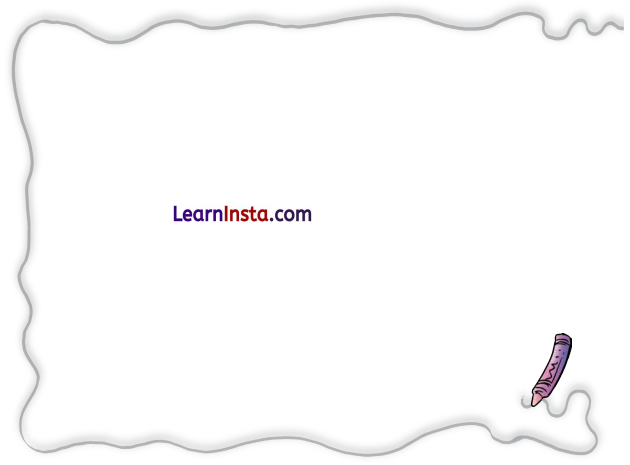
Answer:
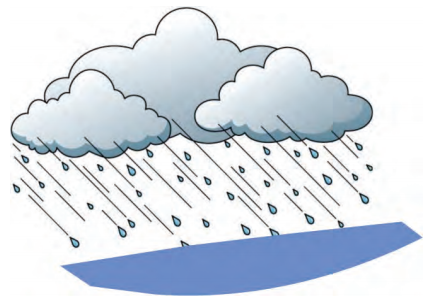
Find Out (Page 89)
Question 1.
Do you think it will rain again today? Or tomorrow? Why do you think so?
Answer:
I think it won’t rain again today or tomorrow because the sky is clear and only has a few white fluffy clouds.
Question 2.
Did it rain only in your area or in other nearby places as well? Make a guess, then ask and find out.
Answer:
I think that it rained not only in my area but also in nearby places as well.
![]()
Question 3.
Find some songs about the rain or make up one, in your language or any other. Sing some songs about the rain.
Answer:
Find yourself and sing.
Question 4.
Did the rain make you happy? Did it make everyone happy?
Answer:
Yes, the rain makes me happy. I think it makes everyone happy.
Find Out (Page 90)
Question 1.
Is there a stream, river, pond or lake near your village or city? Find out its name and some information about it. Visit it and draw its picture. Draw any trees, birds or animals that you see around it.
Answer:
Yes, a river is near my city. It’s name is ‘Yamuna’.
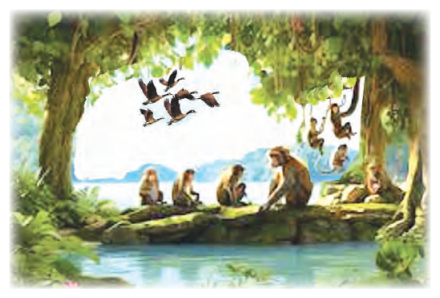
The Yamuna river is a very big and sacred river. It starts from a place called Yamunotri in the Himalayan mountains.
Question 2.
Find a poem about a river and sing it in the class.
Answer:
River’s gentle waters flow.
Soothing sounds, as they go.
Through forests, fields and town.
Bringing life, to all around with every bend, a new view.
Reflections of sky and tree too.
Fish swim deep, birds fly above.
In harmony, a song of love.
Discuss (Page 91)
Question 1.
Where do you get water from?
Answer:
I get water from a tap. I found out a tank on terrace where the water is stored. The water reached there through a bigger pipe and stored. The pipe which bring to water to the tank comes from the main water storage tank of our locality.
Find Out (Page 91)
Question 1.
Do you get water delivered in a tanker? If yes, find out where the tankers bring water from. Does your water come from a well, river or lake near your village or city?
Answer:
Yes, sometimes water delivered through tankers also. Tankers bring water from various sources, including borewells near lakes. My water comes from a river near the city.
Question 2.
Do you know anyone who faces difficulty in getting water every day?
Answer:
Yes, my relatives living in another city faces difficulty in getting water every day.
Write (Page 92)
Question 1.
List all the activities you can think of for which we need water.
Answer:
The activities for which we need water are: brushing teeth, bathing, cooking, washing clothes, cleaning and drinking etc.
![]()
Question 2.
How many mugs of water do you need to brush your teeth? How much water do you use to take a shower?
Answer:
- To brush teeth I need one mug of water.
- To take a shower I use a bucket of water.
Find Out (Page 93)
Ask your grandparents or any elder:
Question 1.
How did they get water? Did they use water in the same way as you do?
Answer:
My grandparents get water from wells. No, they did not use water in the same way as I do. They did not waste water.
Question 2.
How did they store water?
Answer:
They stored water in Metal pots.
Question 3.
Write a short story about what you found out.
Answer:
My grandparents were more mindful of water and took great care to conserve it. They never wasted it and stored it properly, so they never faced the problem of running out of water.
Activity-3 (Page 94)
Put up an Exhibition
Question 1.
Identify different vessels used to keep water in your home.
Answer:
Bucket, Earthen pot (Mataka), jug, tub, bottles and glasses.
Question 2.
Ask the elders in your family what types of vessels they stored water in.
Answer:
They stored water in Brass, copper vessels and in earthen pots.
Question 3.
Were they different from what we use now?
Answer:
Yes, they were different slightly.
Question 4.
Did the vessels have different names?
Answer:
They named as ‘Kalsha’, gagar, lotah, surahi etc.
Question 5.
On a separate sheet of paper draw a picture of any vessel that you find interesting and write its name in your language.
Answer:
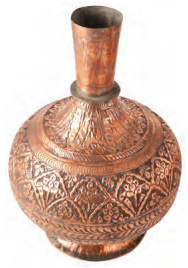
Question 6.
Put up an exhibition of these pictures in your classroom with the help of your teacher.
Answer:
Do yourself.
Question 7.
Walk around and observe the drawings by your classmates.
Answer:
Do yourself.
![]()
Question 8.
How many different kinds of vessels have been drawn?
Answer:
Do yourself.
Question 9.
Did you find any patterns on the vessels?
Answer:
Do yourself.
Stop for a Moment and Think! (Page 95)
Question 1.
What happens to water after we use it?
Answer:
When we use water, it goes down the drain and then to treatment plant. After treatment clean water releases into rivers.
Let us Reflect (Page 98)
A. Write
Question 1.
You waited for rain and watched how raindrops fell to the ground. You collected rainwater and observed if it was clean or dirty. You saw what happened to the rainwater that fell in different places. Now write a few lines on your observations of the rain.
Answer:
- Rainwater flows across the land, forming streams and rivers.
- Rainwater gets soaked into the soil.
- Some of the rainwater gets stored under the ground.
- Some of the water gathers in puddles, ponds, lakes and in the seas.
Question 2.
You found out the name and some information about a stream, river, well, pond or lake near your place. Write it in a few lines: Is this water used for drinking? If yes, how is this water carried to your home? If it is not used, why not? Was it used in the past?
Answer:
‘Yamuna’ river is near my city. The Yamuna river water is not directly used for drinking purpose, because of its polluted state. The river water is being polluted by industrial and domestic waste. Yes, it was used in drinking purpose in past.
B. Draw
Draw a picture of your birdbath. Write the names of the birds and insects that come to drink water from your birdbath.

Answer:
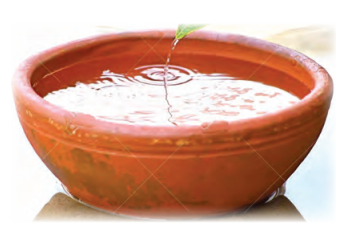
Sparrows, pigeons, crows, parrots, and some moths come to my birdbath to drink water.
![]()
C. Discuss
Water is very precious. We should be cautious about how we use it. We should not waste even a drop of water. Discuss among yourselves and list the activities in your house or outside, due to which water gets polluted or wasted. How can we avoid wastage of water? Think of three solutions with your group and write them in your notebook.
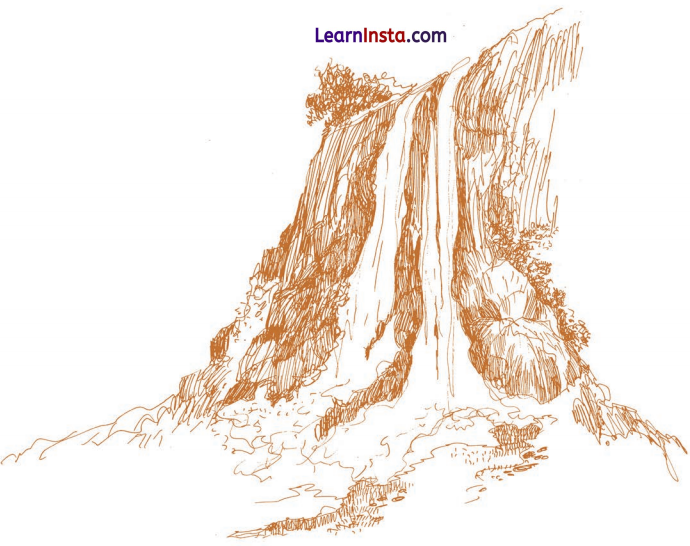
Answer:
- Turn off the tap while brushing teeth.
- Consider using a bucket bath instead of a shower to conserve water.
- Use small amount of soap to clean our hands, as excess soap can waste water when rinsing.